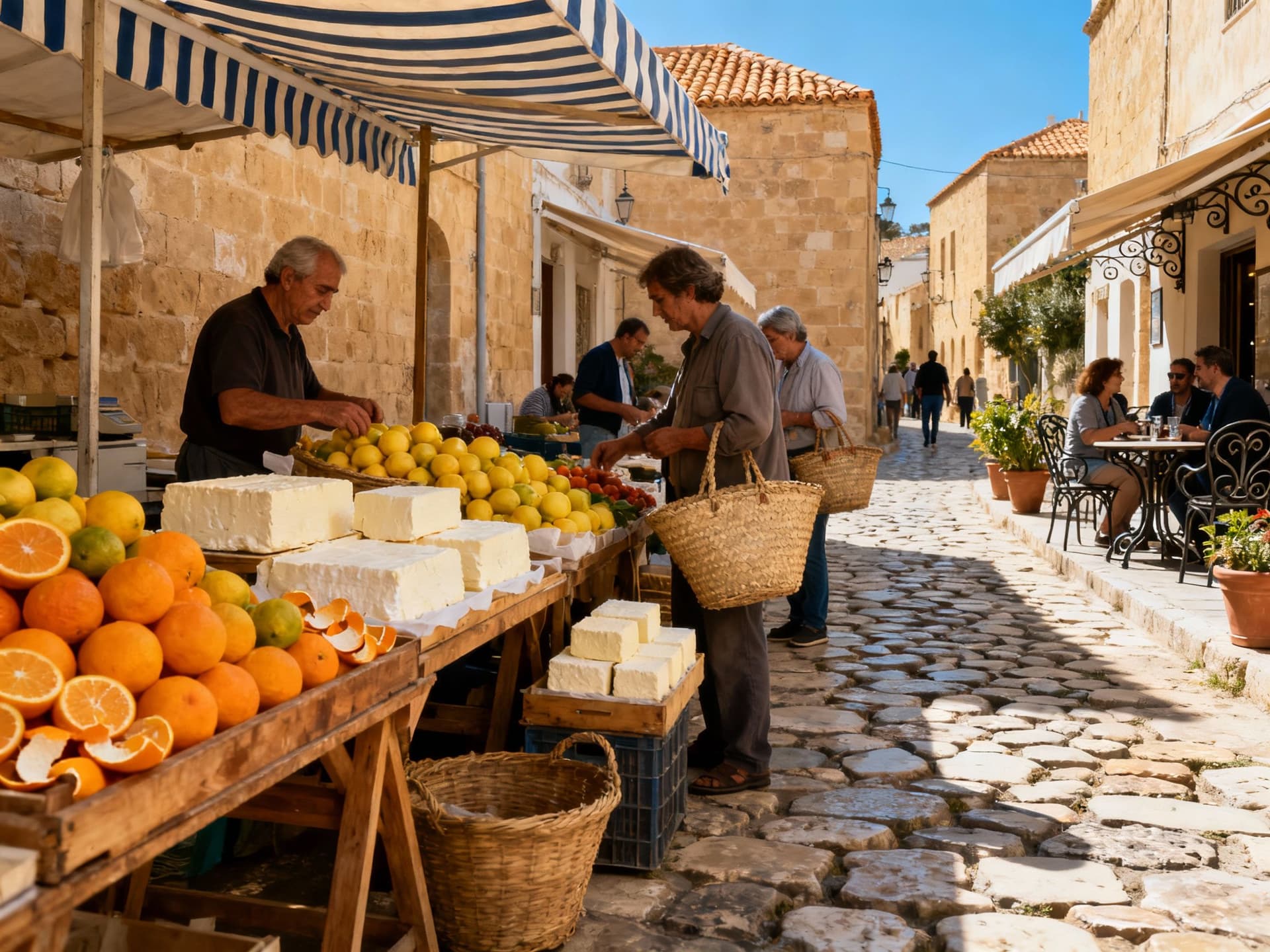Cyprus Risk Playbook: Seasonal, Water & Yield Sensitivities
A lifestyle-led sensitivity guide for Cyprus investors — model tourism, water and cost shocks to protect yields and match neighbourhood choice to tenant profiles.
Imagine sitting at a small table on Ledra Street in Nicosia, espresso steaming, a warm wind carrying the smell of bakery honey and sea salt from the coast. In Cyprus that scene is normal: compact historic centres, sun-bleached coastal promenades, and mountain villages where bakeries open before dawn. But beneath the bougainvillea and aperitivo culture are quantifiable risks — seasonality, water stress, and rental‑demand concentration — that materially affect yields. This guide blends lived-in colour with hard scenarios: how a dry winter, a tourism shock, or a regulatory tweak could reprice returns and what sensitivity tests to run before you buy.
Living the Cyprus lifestyle

Cyprus moves at two speeds: the slow ritual of village markets and café life, and the summer surge around beaches like Fig Tree Bay and Coral Bay. Limassol hums with year-round business energy and a busy marina; Paphos is quieter off-season but sees high tourist concentrations during summer; Larnaca bridges local life with airport access. For an investor this means tenant profiles shift by district — professional tenants and digital nomads in Limassol, seasonal holiday lets in Paphos and Ayia Napa — and that difference drives cashflow volatility.
Neighborhood spotlight: Limassol’s seafront vs old town
Walk the Limassol seafront promenade at 18:00 and you’ll meet joggers, families, and restaurants full of long-table dining. The Marina and Germasogeia offer new builds with high serviceability and corporate tenants; Old Limassol (Agios Nicolaos) sells lifestyle authenticity and tight rental stock. Price per square metre and gross yields differ: seafront apartments command premiums and lower gross yields but stronger capital-liquidity; old-town units often present higher gross yields but greater refurbishment and compliance needs.
Food, markets and the seasonal rhythm
Picture Saturday at Paphos municipal market: local halloumi, piles of citrus, and British tourists comparing coastal routes. Tourism hit a new record in 2024 with over 4 million arrivals, concentrated heavily in Paphos, Ayia Napa and Larnaca, which feeds short‑let demand but amplifies seasonality. That seasonal visitor profile supports premium nightly rates in summer but creates vacancy and discounting risk in shoulder months — a structural sensitivity that must be modelled into yield estimates.
- Lifestyle highlights to map to investment strategy: - Strollable neighbourhoods: Limassol Marina (modern buyers), Kato Paphos (tourist core), Larnaca Finikoudes (everyday beach life) - Markets and cafés: Paphos municipal market, Nicosia’s Laiki Yitonia lanes - Hidden gems: Sea caves near Peyia for weekend renters, mountain trails in Troodos for slow-season demand - Seasonal events: summer festivals and Easter processions that spike local bookings - Transit anchors: Larnaca and Paphos airports — upgrades here reprice accessibility
Making the move: practical risk and sensitivity rules

Lifestyle sells the dream; numbers defend the purchase. Before you sign, run three scenario stress-tests: a tourism drop (‑30% summer arrivals), a slow‑sales period (6–12 months of listing friction), and an environmental operational shock (water restrictions or infrastructure outage). Each scenario should alter vacancy, achievable rent, and operating costs in your model. Cyprus’s island scale makes these risks non‑trivial because single shocks — like a dry winter — can affect hotels, water supply, and local agriculture simultaneously.
Property styles and their cash‑flow sensitivity
Apartments near the coast have rental yield compression risk when purchase premiums rise; village houses show slower capital appreciation but better net yields if acquisition price is right. Recent data shows gross yields vary by district (Limassol higher rents but higher prices; Paphos stronger short‑let economics). Use net yield (gross rent minus OPEX, management, vacancy) as your working metric and calculate a worst‑case net yield under a 20–40% summer revenue swing. Document assumptions: cleaning fees, utility pass‑through, and licence compliance costs.
How local agents protect returns
A local agency does two things that materially reduce risk: granular tenant segmentation and compliance navigation. They source reliable long-term tenants in Limassol’s business belts, curate short‑let portfolios in Paphos with dynamic pricing strategies, and handle licences, permitting, and local tax filings that otherwise create hidden costs. Choose agencies that share historical occupancy and net yield case studies — not glossy staging photos — and demand references from landlords who faced seasonal shocks.
- Step-by-step sensitivity checklist to run before purchase: 1. Build a 3-year cash‑flow with monthly granularity and include seasonal occupancy variance. 2. Run a -30% tourism revenue case and a -10% long‑term rent case to see covenant stress points. 3. Add a +15% operating cost scenario to cover water or energy surcharges. 4. Test exit scenarios: 6‑, 12‑, and 24‑month time-to-sale assumptions with price discounts. 5. Confirm contingency reserves (3–6 months mortgage + CAPEX fund) and quantify their impact on IRR.
Insider knowledge: what expats wish they’d known
Expat owners consistently say: the island charm hides operational headaches. Water shortages, infrastructure delays, and regulatory updates (licensing for short‑lets) have real cashflow consequences. Cyprus has recently invested in airport and water infrastructure improvements, signalling government focus on tourism resilience, yet local execution timelines can lag. Expect paperwork friction and seasonally skewed rental demand; treat both as quantifiable line items, not surprises.
Cultural integration and day-to-day realities
Cypriots are welcoming and many services operate in English, easing day‑one living. But social norms matter: small neighbourhood networks control local rentals and renovations, and island logistics affect timelines for contractors and deliveries. Build local trust through an agent with deep neighbourhood roots and a network of tradespeople — that social capital reduces refurbishment delays and cost overruns that otherwise erode projected yields.
Long-term lifestyle and market sustainability
Cyprus’s tourism growth and airport upgrades (Larnaca and Paphos expansions) point to demand resilience, but water and climate risk require active asset management. Prioritise properties with independent water solutions (rainwater capture potential, efficient plumbing) and energy efficiency to reduce OPEX exposure. Over five to ten years, neighbourhoods with diversified demand — proximate to business centres, healthcare and schools — will show lower yield volatility than single‑use tourist strips.
- Red flags and quick checks: - Heavy reliance on summer short‑lets in a single building or management company - Properties without documented utility performance or water contingency plans - Unproven rental management promises without historical occupancy data - Significant ongoing communal or maintenance liabilities (upper-floor pools, ageing façades) - Over-reliance on speculative airport or infrastructure timelines
Conclusion — fall in love, then underwrite the romance. Cyprus offers genuine lifestyle reward: Mediterranean light, café culture, and compact communities. But treat the island like any investable market: quantify seasonality, water and infrastructure risk, and agent competence before you allocate capital. If you need a starting point, ask an agent for historical monthly occupancy by unit, three years of P&L, and documented contingency plans; those three documents tell you more than any staged terrace photo.
Danish relocation specialist who moved to Cyprus in 2018, helping Nordic clients diversify with rental yields and residency considerations.


